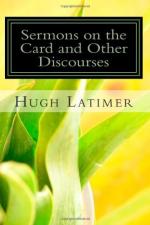Would Christ this word, “by himself,” had been better weighed and looked upon, and in sanctificationem, to make them holy; for he is juge sacrificium, “a continual sacrifice,” in effect, fruit, and operation; that like as they, which seeing the serpent hang up in the desert, were put in remembrance of Christ’s death, in whom as many as believed were saved; so all men that trusted in the death of Christ shall be saved, as well they that were before, as they that came after. For he was a continual sacrifice, as I said, in effect, fruit, operation, and virtue; as though he had from the beginning of the world, and continually should to the world’s end, hang still on the cross; and he is as fresh hanging on the cross now, to them that believe and trust in him, as he was fifteen hundred years ago, when he was crucified.
Then let us trust upon his only death, and look for none other sacrifice propitiatory, than the same bloody sacrifice, the lively sacrifice; and not the dry sacrifice, but a bloody sacrifice. For Christ himself said, consummatum est: “It is perfectly finished: I have taken at my Father’s hand the dispensation of redeeming mankind, I have wrought man’s redemption, and have despatched the matter.” Why then mingle ye him? Why do ye divide him? Why make you of him more sacrifices than one? Paul saith, Pascha nostrum immolatus est Christus: “Christ our passover is offered;” so that the thing is done, and Christ hath done it semel, once for all; and it was a bloody sacrifice, not a dry sacrifice. Why then, it is not the mass that availeth or profiteth for the quick and the dead.
Wo worth thee, O devil, wo worth thee, that hast prevailed so far and so long; that hast made England to worship false gods, forsaking Christ their Lord. Wo worth thee, devil, wo worth thee, devil, and all thy angels. If Christ by his death draweth all things to himself, and draweth all men to salvation, and to heavenly bliss, that trust in him; then the priests at the mass, at the popish mass, I say, what can they draw, when Christ draweth all, but lands and goods from the right heirs? The priests draw goods and riches, benefices and promotions to themselves; and such as believed in their sacrifices they draw to the devil. But Christ is he that draweth souls unto him by his bloody sacrifice. What have we to do then but epulari in Domino, to eat in the Lord at his supper? What other service have we to do to him, and what other sacrifice have we to offer, but the mortification of our flesh? What other oblation have we to make, but of obedience, of good living, of good works, and of helping our neighbours? But as for our redemption, it is done already, it cannot be better: Christ hath done that thing so well, that it cannot be amended. It cannot be devised how to make that any better than he hath done it. But the devil, by the help of that Italian bishop yonder, his chaplain, hath laboured




